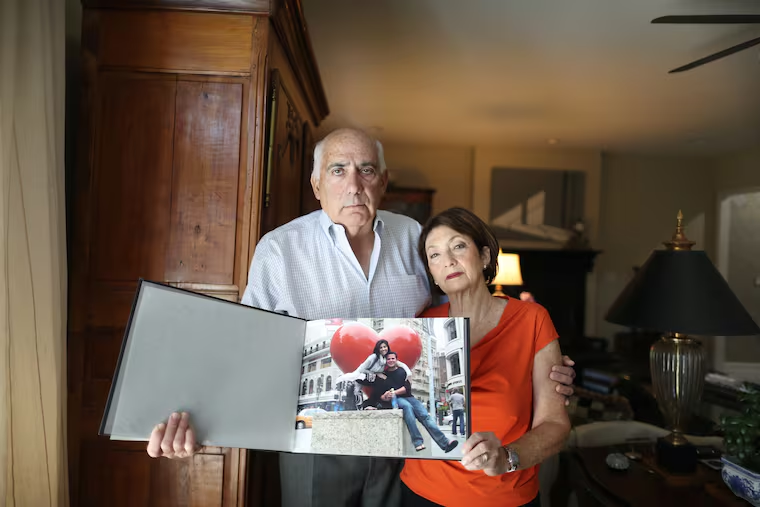Case of Philly teacher Ellen Greenberg, whose 2011 death by 20 stab wounds was ruled suicide, heard by court
Ellen Greenberg's death was ruled homicide, then switched to suicide without explanation. Her parents are fighting to take their civil suit to trial.

Commonwealth Court judges called the case of Ellen Greenberg — whose 2011 death by 20 stab wounds was ruled a homicide then switched to suicide by the Philadelphia Medical Examiner’s Office — “very tragic” and “perplexing” during appeal arguments presented in the case Tuesday.
Last year, Philadelphia Court of Common Pleas Judge Glynnis D. Hill ruled a civil suit filed by Ellen’s parents, Joshua and Sandra Greenberg of Harrisburg, against the Medical Examiner’s Office and Marlon Osbourne, the pathologist who conducted their daughter’s autopsy, could proceed to trial.
In the suit the Greenbergs seek to have the manner of their daughter’s death changed back to homicide or undetermined, which would allow for an investigation to be reopened and a wrongful-death or misconduct lawsuit to be filed against the city.
But following the ruling from Hill in October 2021, the city filed an appeal, claiming Hill’s decision to allow the case to move forward was “an egregious abuse of discretion that ignored binding precedent” and that even if the medical examiner’s findings were incorrect “... the law makes clear that a medical examiner can be wrong as to the manner of death yet cannot be compelled to change it.”
The Commonwealth Court took up the appeal in February and the civil trial was placed on hold. Arguments by the Greenbergs’ attorney, Joseph Podraza, and Kelly Diffily, senior attorney with the city’s Law Department, were heard by a panel of three Commonwealth judges at the Widener Building in Center City.
Ellen Greenberg, 27, a first-grade teacher, was found by her fiancé, Samuel Goldberg, in the kitchen of their Manayunk apartment with 20 stab wounds and a 10-inch knife lodged in her chest on Jan. 26, 2011.
Investigators on scene treated her death as a suicide because the apartment door — which Goldberg said he broke down — was locked from the inside, there were no signs of an intruder, and Greenberg had no defensive wounds, police have said.
But the next morning at autopsy, Osbourne ruled her death a homicide. Police publicly disputed the medical examiner’s findings and Osbourne later changed his ruling to suicide, with no explanation to the Greenbergs.
In their search for answers, the Greenbergs retained numerous forensic experts who have questioned authorities’ findings, as first detailed in a March 2019 Inquirer report.
The city argues that under the law, a medical examiner’s opinion can’t be challenged, but Podraza believes testimony from depositions in the civil suit necessitate the ruling be changed.
Osbourne testified at deposition that before he changed his ruling he was called to a meeting with members of the Police Department and District Attorney’s Office. He said police told him a doorman was with Goldberg when he broke the door down, which Osbourne said factored into his decision to reverse the ruling.
But the doorman signed an affidavit saying he didn’t accompany Goldberg to the door and video surveillance corroborates his statement.
In a written opinion supporting his ruling, Hill said Osbourne’s choice to rely on information from police without independently confirming it raises “a legitimate question to be resolved at trial as to whether Defendant Osbourne abused his discretion.”
In court Tuesday, Diffily said the Greenbergs were asking for a “sea change” in the law and argued if the case were to proceed, it would open the floodgates for other lawsuits.
“They could be desperate for any way to resolve this,” Judge Ellen Ceisler said during Diffily’s arguments. “You should have a little empathy here.”
Podraza argued that based on Osbourne’s testimony in depositions that he would have ruled Ellen Greenberg’s death closer to “undetermined” if there was a dispute about whether the door was broken down and whether the doorman was with Goldberg when it was broken, the ruling must be changed.
“I’m not challenging Dr. Osbourne’s opinion, I’m effectuating it,” he said.
As arguments wrapped up, Ceisler called it “a most perplexing case” and Judge Patricia A. McCullough said: “It is. Very tragic.”
In an emailed statement, city spokesperson Kevin Lessard said allowing the case to move forward puts the “independence and integrity” of the Medical Examiner’s Office at risk and “would have serious implications beyond these immediate circumstances.”
“For death investigation processes to retain their integrity, it is critical that the Medical Examiner and their staff, who have years of specialized training, be able to do their jobs independently, free of pressure, influence, and threats of litigation by families,” he wrote.
Last month, the Greenbergs filed a second civil suit against members of the ME’s Office, the Police Department, and the DA’s Office seeking monetary damages.
“Based on the information that we acquired in the underlying case of the first lawsuit, we believe that the facts support an ongoing concealment of a homicide,” Podraza said in an interview last week.
That suit remains ongoing, as does an independent investigation into the case by the Chester County District Attorney’s Office, which began in August when the Attorney General’s Office referred the case out due to the appearance of a conflict of interest.
It’s unclear when the Commonwealth Court will issue its ruling — it could be months — but Podraza said if the court sides with the city, he will petition for an appeal to the Supreme Court of Pennsylvania.
“The issues here are just too important and the need to get justice for Ellen needs to be pursued by all avenues,” he said.